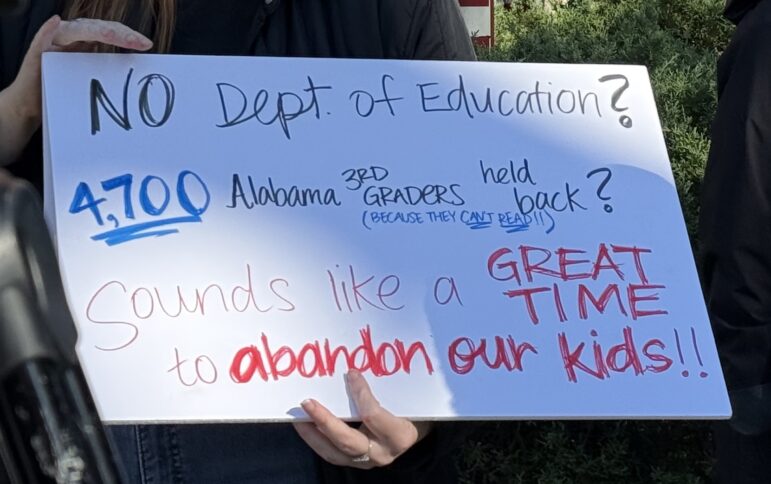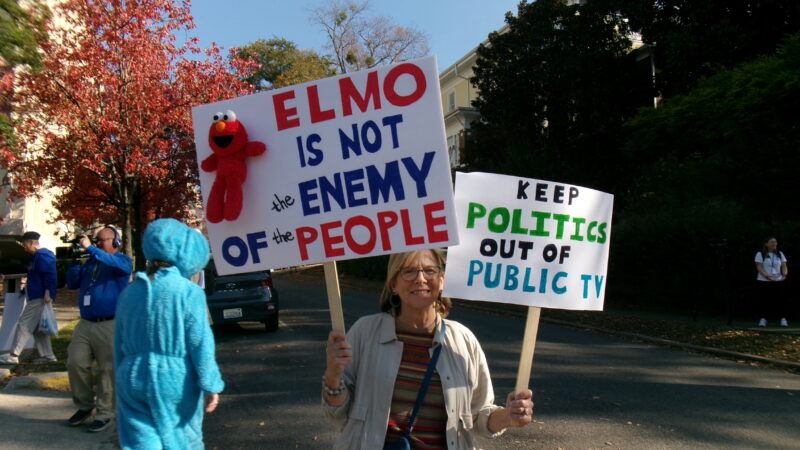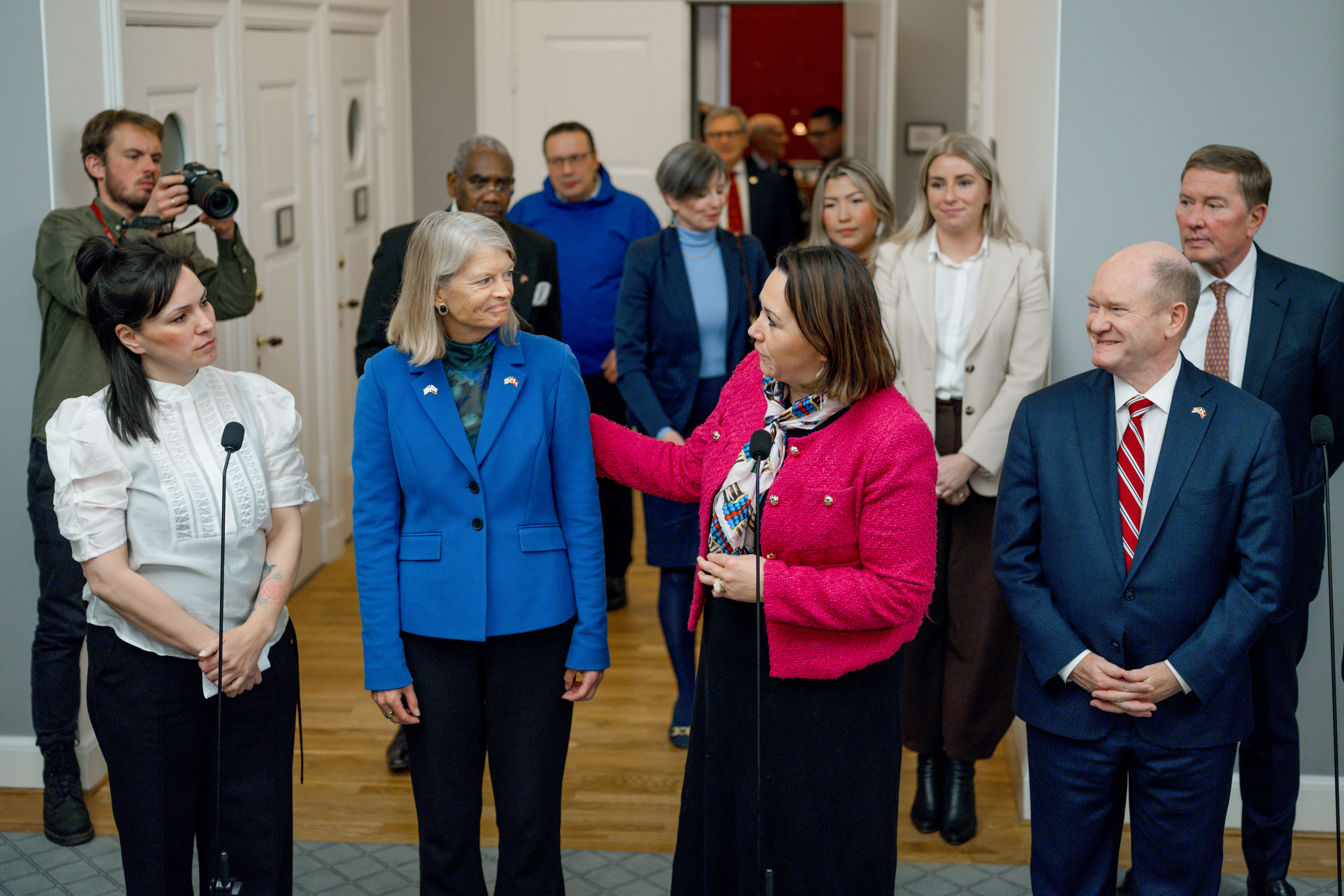Alabama Public Television meeting draws protesters in Birmingham over discussion of disaffiliating from PBS
It’s not every day two people dressed as Sesame Street’s Cookie Monster can be seen walking around Birmingham’s Five Points South neighborhood. But that was the case Tuesday morning as community members gathered outside of Alabama Public Television’s Birmingham office to protest a move to disaffiliate the network from PBS.
Some members of the Alabama Educational Television Commission, which oversees APT, said disaffiliation is needed because the network has to cut costs after the Trump administration eliminated all funding for public media this summer. They also allege PBS’s news programming has a left-leaning bias. Commissioners were set to discuss the issue at a Tuesday morning meeting.
Before the meeting, protesters came in Sesame Street costumes, handed out cookies, and carried signage with popular characters on them.
Dahlia Abrams and Julie Reese were the two dressed as Cookie Monster. When asked what Cookie Monster would have to say about the possible disaffiliation, Reese responded in character.
“Me no like this. Me want free programming for all children.”
Reese wasn’t the only one concerned for Alabamian children’s access to public educational programming.

“APT was founded with a goal, even before the PBS partnership, with the goal of bringing equity in education to the state. And 90 percent of APT’s programming to accomplish that is PBS. Some kids can’t afford pre-k and learned to read through this programming.” McKenzie Burton said.

Whitney Mitchell is a mother of a fifth grader, who attended kindergarten during the pandemic. PBS was a resource for her daughter to learn how to read.
“ Having it during that tough time, I can’t imagine us voluntarily deciding to deny our children that resource,” Mitchell said. “Alabama’s always, you know, race to the bottom in everything else, whether it’s literacy, our kids being safe, and I just don’t understand why we would shoot ourselves in the foot like this.”
Mitchell, who grew up in rural Alabama herself, said PBS had impact on her own education and socialization.
“ It taught me how to live in the world. I grew up out in the sticks in the woods and having that character education about seeing people who are different than me on the screen. It is just such an invaluable resource. I don’t understand why we would try to get rid of that.” Mitchell said.
Grayson Brown was also in attendance.
“ I’m a little concerned about the government taking away our freedom, taking away our TV stations. I realize what happened in Nazi Germany. I don’t like that kind of attacking the freedom to live our lives.”
He enjoys Ken Burns’ documentaries and British comedies that air on PBS.
“It’s mainly freedom that I’m concerned about.” Brown explained.
During Tuesday’s meeting, the commission decided that they would keep PBS programming through at least June 2026. This follows a letter from Gov. Kay Ivey sent the day before in which she encouraged commissioners to delay a decision on disaffiliation until public opinion on the matter could be gathered and a plan for what’s next could be developed. In line with Ivey’s request, the commission also decided to open avenues for public comment and push a decision to a later date.
Includes reporting from WBHM’s Andrew Gelderman
Vahini Shori is a Report for America corps member covering faith and culture for WBHM.
This reporting is supported by WBHM’s Local Journalism Innovation Fund. Find out more about the fund and how to donate here.
Trump has rolled out many of the Project 2025 policies he once claimed ignorance about
Some of the 2025 policies that have been implemented include cracking down on immigration and dismantling the Department of Education.
U.S. lawmakers wrap reassurance tour in Denmark as tensions around Greenland grow
A bipartisan congressional delegation traveled to Denmark to try to deescalate rising tensions. Just as they were finishing, President Trump announced new tariffs on the country until it agrees to his plan of acquiring Greenland.
Can exercise and anti-inflammatories fend off aging? A study aims to find out
New research is underway to test whether a combination of high-intensity interval training and generic medicines can slow down aging and fend off age-related diseases. Here's how it might work.
The 2026 Olympics are the most widespread in history. See what’s happening where
Competitions will be hosted at 25 venues spanning an area of more than 8,000 square miles. Here's what's happening at each of the four main clusters.
High-speed trains collide after one derails in southern Spain, killing at least 21
The crash happened in Spain's Andalusia province. Officials fear the death toll may rise.
United Nations leaders bemoan global turmoil as the General Assembly turns 80
On Saturday, the UNGA celebrated its 80th birthday in London. Speakers including U.N. Secretary-General António Guterres addressed global uncertainty during the second term of President Trump.






